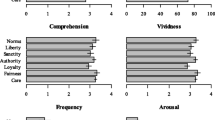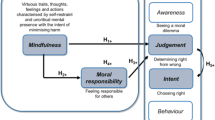Abstract
The present paper poses a new problem for moral luck. Defenders of moral luck uncritically rely on a broader theory of luck known as the control theory or the lack of control theory. However, there are are two other analyses of luck in the literature that dominate discussion in epistemology, namely the probability and modal theories. However, moral luck is nonexistent under the probability and modal accounts, but the control theory cannot explain epistemic luck. While some have posited that “luck” is ambiguous, so that one theory of luck is operative with epistemic luck and a different theory works for moral luck, there are both semantic and philosophical reasons to reject luck ambiguity. Defenders of moral luck must engage with the broader literature on luck and either provide a comprehensive defense of the control theory or concede that moral luck is not a genuine thing in its own right.
Similar content being viewed by others
Notes
For further discussion of necessary truths and their implications for theories of luck, see Hales (2015).
On Bonnard’s perfectionism, see Grande (2009).
God’s grace was short-lived in any event; Bradford was later burned at the stake for heresy.
Zagzebski (1994) argues that this is in fact inevitable.
See Church (2013) for a recent defense.
Carter (2015) is the exception that proves the rule. He’s willing to let knowledge be compatible with some luck, just so long as it isn’t too much.
See Ballantyne (2014) for a fuller discussion. All I mean by a “fundamental” account of luck in this context is the genus-level distinctions among the probability, modal, and control views, not the species-level distinctions among constitutive, outcome, circumstantial, brute, and option luck.
Wegner (2002) chapter 1 has a nice discussion of many of these.
References
Alston, W. P. (1988). The deontological conception of epistemic justification. Philosophical Perspectives, 2, 257–299.
Ambegaokar, V. (1996). Reasoning about luck: Probability and its uses in physics. Cambridge: Cambridge University Press.
Arneson, R. J. (2011). Luck egalitarianism—A primer. In C. Knight & Z. Stemplowska (Eds.), Responsibility and Distributive Justice. Oxford: Oxford University Press.
Athanassoulis, N. (2005). Morality, Moral Luck and Responsibility: Fortune's Web. New York: Palgrave Macmillan Press.
Bailey, A. (1998). Privilege: Expanding on Marilyn Frye’s “Oppression”. Journal of Social Philosophy, 29(3), 104–119.
Ballantyne, N. (2014). Does luck have a place in epistemology? Synthese, 191, 1391–1407.
Bewersdorff, J. (2005). Luck, logic, and white lies: The mathematics of games. Wellesley, MA: A. K. Peters.
Card, C. (1996). The unnatural lottery: Character and moral luck. Philadelphia: Temple University Press.
Carter, J. A. (2015). Robust virtue epistemology as anti-luck epistemology: A new solution. Pacific Philosophical Quarterly, forthcoming.
Cholbi, M. (2014). Luck, blame, and desert. Philosophical Studies, 169, 313–332.
Church, I. M. (2013). Getting ‘Lucky’ with Gettier. European Journal of Philosophy, 21(1), 37–49.
Cohen, G. A. (2011). In M. Otsuka (Ed.), On the currency of egalitarian justice and other essays in political philosophy. Princeton: Princeton University Press.
Dunbar, G. (2001). Towards a cognitive analysis of polysemy, ambiguity, and vagueness. Cognitive Linguistics, 12(1), 1–14.
Dworkin, R. (2000). Sovereign virtue. Cambridge, MA: Harvard University Press.
Eidinow, E. (2011). Luck, fate and fortune: Antiquity and its legacy. Oxford: Oxford University Press.
Enoch, D., & Marmor, A. (2007). The case against moral luck. Law and Philosophy, 26(4), 405–436.
Gillon, B. S. (1990). Ambiguity, generality, and indeterminacy: Tests and definitions. Synthese, 85(3), 391–416.
Goldberg, S. (2015). Epistemic entitlement and luck. Philosophy and Phenomenological Research, forthcoming.
Grande, J. K. (2009). Pierre Bonnard: The late interiors. Vie des Arts, 53(215), 6–7.
Greco, J. (2010). Achieving knowledge: A virtue-theoretic account of epistemic normativity. Cambridge: Cambridge University Press.
Hales, S. D. (Ed.). (2011). A companion to relativism. Malden, MA: Wiley-Blackwell.
Hales, S. D. (2015). Why Every Theory of Luck is Wrong. Noûs, forthcoming
Hanna, N. (2014). Moral luck defended. Noûs, 48, 683–698.
Knight, C. (2013). Luck egalitarianism. Philosophy Compass, 8(10), 924–934.
Kripke, S. (1977). Speaker’s reference and semantic reference. Midwest Studies in Philosophy, 2(1), 255–276.
Lackey, J. (2008). What luck is not. Australasian Journal of Philosophy, 86(2), 255–267.
Large, M. (2013). The relevance of the early history of probability theory to current risk assessment practices in mental health care. History of Psychiatry, 24, 427–441.
Levy, N. (2011). Hard luck: How luck undermines free will and moral responsibility. Oxford: Oxford University Press.
Martinez, F. D. (2007). Genes, environments, development and asthma: A reappraisal. European Respiratory Journal, 29(1), 179–184.
Mazur, J. (2010). What’s luck got to do with it? The history, mathematics, and psychology of the Gambler’s illusion. Princeton: Princeton University Press.
Nagel, T. (1979). `Moral Luck’, mortal questions (pp. 24–38). Cambridge: Cambridge University Press.
Nelkin, D. K. (2013). Moral luck’. In E. N. Zalta (Ed.), The Stanford encyclopedia of philosophy (Winter 2013 edn.). Cambridge: MIT Press.
Peels, R. (2015). A modal solution to the problem of moral luck. American Philosophical Quarterly, forthcoming.
Pritchard, D. (2005). Epistemic luck. Oxford: Oxford University Press.
Pritchard, D. (2012). Anti-luck virtue epistemology. The Journal of Philosophy, 109(3), 247–279.
Pritchard, D. (2014). The modal account of luck. Metaphilosophy, 45(4–5), 594–619.
Quine, W. V. (1960). Word and object. Cambridge, MA: MIT Press.
Rescher, N. (1995). Luck: The brilliant randomness of everyday life. New York: Farrar Straus Giroux.
Royzman, E., & Kumar, R. (2004). Is consequential luck morally inconsequential? Empirical Psychology and the Reassessment of Moral Luck’, Ratio, 17(3), 329–344.
Sennet, A. (2011). Ambiguity. In E. N. Zalta (ed.), The Stanford encyclopedia of philosophy (Summer 2011 edn.).
Sinclair, B. (2014). Roman chariot racing. In P. Christesen & D. G. Kyle (Eds.), A companion to sport and spectacle in Greek and Roman antiquity (pp. 492–504). Malden, MA: Wiley.
Sosa, E. (2011). Knowing full well. Princeton: Princeton University Press.
Tan, K.-C. (2012). Justice, institutions, and luck. Oxford: Oxford University Press.
Wegner, D. M. (2002). The illusion of conscious will. Cambridge: MIT Press.
Zagzebski, L. (1994). The inescapability of Gettier problems. Philosophical Quarterly, 44(174), 65–73.
Zimmerman, M. J. (2006). Moral luck: A partial map. Canadian Journal of Philosophy, 36(4), 585–608.
Acknowledgments
This paper was first written as a visiting professorial fellow at the Eidyn Research Centre in the University of Edinburgh. I am tremendously grateful for their hospitality, fellowship, and critical acumen, especially Duncan Pritchard, Sandy Goldberg, and J. Adam Carter. I also appreciate the helpful comments from a referee for Philosophical Studies.
Author information
Authors and Affiliations
Corresponding author
Rights and permissions
About this article
Cite this article
Hales, S.D. A problem for moral luck. Philos Stud 172, 2385–2403 (2015). https://doi.org/10.1007/s11098-014-0417-6
Published:
Issue Date:
DOI: https://doi.org/10.1007/s11098-014-0417-6




